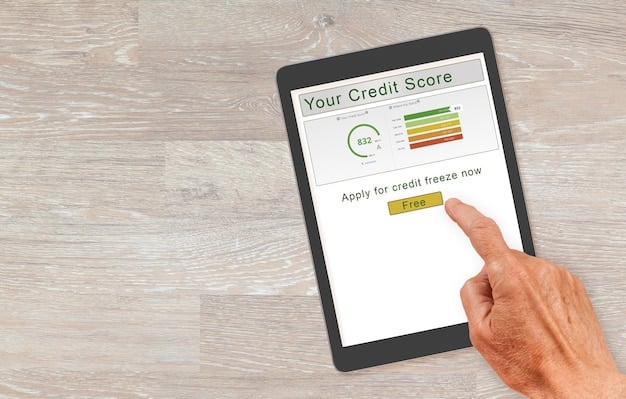Credit Score Secrets: Boost Your Score by 50+ Points

Credit score secrets involve implementing strategies such as correcting errors on your credit report, paying down high credit card balances, and making all payments on time, which can collectively increase your credit score by 50 points or more.
Want to unlock the credit score secrets that can significantly improve your financial health? A better credit score can open doors to lower interest rates, better loan terms, and overall financial freedom. Keep reading to discover actionable strategies to boost your score by 50 points or more.
Credit Score Basics: Understanding the Numbers
Before diving into the credit score secrets, it’s crucial to understand the basics of what makes up your credit score. Your credit score is a three-digit number that reflects your creditworthiness, based on your credit history.
Several factors contribute to your credit score, each carrying a different weight. Understanding these components allows you to focus on the areas that need the most improvement.
Key Factors Influencing Your Credit Score
Your credit score is primarily influenced by five factors: payment history, amounts owed, length of credit history, new credit, and credit mix. Each of these plays a significant role in determining your creditworthiness.
Knowing how these factors are weighted can help you prioritize your efforts and tailor your strategies to maximize your score improvement.
- Payment History: This is the most significant factor. Making on-time payments is critical.
- Amounts Owed: Keeping your credit card balances low in relation to your credit limits is essential.
- Length of Credit History: A longer credit history generally results in a higher score.
- New Credit: Opening too many new accounts in a short period can lower your score.
- Credit Mix: Having a mix of different types of credit accounts (e.g., credit cards, loans) can be beneficial.
By understanding the key factors that influence your credit score, you can strategically work on improving each area to see a significant boost in your overall score.
Dispute Credit Report Errors: Your First Step to Improvement
One of the simplest yet most effective credit score secrets is to review your credit reports from the three major credit bureaus: Experian, Equifax, and TransUnion. Errors on your credit report can negatively impact your score.
Correcting inaccuracies can lead to a quick and substantial improvement in your credit score. Regularly checking your credit report is a necessary step in maintaining good credit.

How to Identify and Dispute Errors
Identifying errors on your credit report involves carefully reviewing each account and transaction. Look for incorrect information such as wrong account balances, late payments that were actually on time, or accounts that don’t belong to you.
Once you’ve identified an error, you’ll need to dispute it with the credit bureau. Provide documentation and clear explanations of why the information is incorrect.
- Obtain Your Credit Reports: Request free copies from AnnualCreditReport.com.
- Review Each Report: Look for inaccuracies such as incorrect names, addresses, or account information.
- Gather Documentation: Collect any documents that support your claim, such as bank statements or payment confirmations.
- File a Dispute: Submit a dispute online, by mail, or by phone with each credit bureau.
Disputing credit report errors can be a powerful way to improve your credit score quickly and effectively, often resulting in a noticeable increase in your score.
The Power of Paying Down Credit Card Debt
Another crucial credit score secret is to manage your credit card debt efficiently. High credit card balances can significantly lower your score, so taking steps to reduce this debt is essential.
Reducing your credit utilization ratio, which is the amount of credit you’re using compared to your total available credit, can have a positive impact on your credit score.
Strategies for Lowering Credit Utilization
Lowering your credit utilization involves reducing your credit card balances and keeping them low. Aim to keep your balances below 30% of your credit limit on each card.
If possible, pay off your credit card balances in full each month to avoid accumulating debt and minimize interest charges. This demonstrates responsible credit management.
Here are a few strategies to lower your credit utilization:
- Pay More Than the Minimum: Paying more than the minimum each month reduces your balance faster.
- Balance Transfers: Transfer high balances to cards with lower interest rates.
- Debt Snowball or Avalanche: Use a debt repayment strategy to stay motivated and organized.
- Request Credit Limit Increases: Increasing your credit limits (without increasing spending) can lower your utilization ratio.
Effectively managing and reducing your credit card debt not only improves your credit score but also frees up more of your income for other financial goals.

Consistent On-Time Payments: The Cornerstone of a Good Credit Score
One of the most fundamental credit score secrets is making consistent, on-time payments. Payment history is the most significant factor in determining your credit score.
Late payments can have a severe negative impact on your score, so it’s crucial to ensure that all your bills are paid on time, every time.
Tips for Ensuring Timely Payments
To ensure timely payments, set up automatic payments for all your bills. This way, you won’t have to worry about missing a payment due date.
Use calendar reminders or budgeting apps to track your bills and ensure that you have enough funds available to cover your payments.
Here are some practical tips for making on-time payments:
- Set Up Automatic Payments: Schedule payments from your bank account to avoid missing due dates.
- Use Calendar Reminders: Set reminders on your phone or calendar for upcoming bills.
- Budgeting Apps: Utilize apps like Mint or YNAB to track your income and expenses.
- Contact Creditors: If you’re struggling to make payments, reach out to your creditors to discuss potential payment plans.
Consistently making on-time payments is the cornerstone of a good credit score and demonstrates responsible credit management to lenders.
Becoming an Authorized User: A Quick Boost Strategy
Becoming an authorized user on someone else’s credit card can be a quick and easy credit score secret. This involves being added to an account held by someone with a good credit history.
The positive payment history and credit utilization of the primary cardholder can then reflect positively on your credit report, helping to improve your score.
The Pros and Cons of Authorized User Status
While becoming an authorized user can provide a boost to your credit score, it’s essential to consider both the pros and cons. The primary benefit is that you can leverage the cardholder’s good credit habits.
However, if the primary cardholder has poor credit habits, such as late payments or high credit utilization, it can negatively impact your credit score. Choose wisely when considering this strategy.
Here are a few key points to consider:
- Pros: Quick credit score boost, opportunity to build credit history.
- Cons: Potential negative impact if the primary cardholder has poor credit habits, reliance on someone else’s financial responsibility.
Becoming an authorized user can be a strategic way to improve your credit score, but it’s crucial to carefully evaluate the primary cardholder’s credit habits before agreeing to this arrangement.
Avoid Opening Too Many New Accounts: Maintain a Stable Credit Profile
Opening too many new credit accounts in a short period can negatively impact your credit score. This is because it can signal to lenders that you are taking on too much debt or that you are financially unstable.
Spreading out your credit applications and avoiding unnecessary new accounts can help maintain a stable credit profile and prevent your score from dropping.
Why Too Much New Credit Hurts Your Score
When you open multiple new accounts, it increases the chances that you will overextend yourself financially. Lenders see this as a higher risk, which can lower your credit score.
Additionally, each new credit application triggers a hard inquiry on your credit report, which can also have a small negative impact. Minimizing hard inquiries is a good practice.
Here are a few reasons why too much new credit hurts your score:
- Increased Risk: Lenders perceive you as a higher risk if you’re opening many accounts.
- Hard Inquiries: Each credit application results in a hard inquiry on your credit report.
- Shorter Credit History: New accounts shorten your average credit history length, which can lower your score.
Maintaining a stable credit profile by avoiding unnecessary new accounts can help you achieve and maintain a good credit score over time.
| Key Point | Brief Description |
|---|---|
| ✅ Check Credit Reports | Dispute any errors found on your credit report. |
| 💳 Pay Down Debt | Reduce credit card balances below 30% of your limit. |
| 🗓️ Timely Payments | Always pay your bills on time to avoid negative impacts. |
| ➕ Authorized User | Become an authorized user on a responsible cardholder’s account. |
Frequently Asked Questions
▼
You should check your credit report at least once a year, or more frequently if you are planning to apply for a loan or credit card. Monitoring your credit regularly helps you catch and correct errors quickly.
▼
A good credit utilization ratio is below 30% of your available credit. For example, if you have a credit card with a $1,000 limit, you should aim to keep the balance below $300.
▼
Most negative items, such as late payments or collections, stay on your credit report for up to seven years. Bankruptcies can stay on your report for up to ten years, depending on the type.
▼
Closing a credit card can potentially lower your credit score, especially if it reduces your overall available credit. Keeping the account open (but not using it) can help maintain a healthy credit utilization ratio.
▼
A hard inquiry occurs when you apply for credit, and it can have a small negative impact on your credit score. A soft inquiry occurs when you check your own credit report or when lenders pre-approve you for offers, and it does not affect your score.
Conclusion
Improving your credit score by 50 points or more is achievable with consistent effort and strategic actions. By understanding the key factors that influence your credit score, disputing errors, managing your credit card debt, and ensuring on-time payments, you can take control of your financial health and unlock better opportunities. Start implementing these credit score secrets today and watch your credit score climb!





